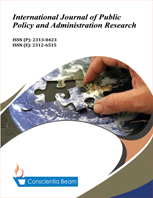Public service motivation in Vietnam: Insights from a Q-methodology approach
DOI:
https://doi.org/10.18488/74.v12i1.4156Abstract
This study explores Public Service Motivation (PSM) in Vietnam, a developing country, to address the limited research on PSM in such contexts. It examines individual perspectives on PSM and identifies its key dimensions within public higher education institutions. Using Q-methodology, the study collects and analyzes data from 28 public employees in Vietnamese higher education institutions. Data were gathered between July and September 2021, employing a structured approach to capture diverse viewpoints on PSM. The analysis identifies four distinct dimensions of PSM: Activistic Patriotism, Egoistic Patriotism, Realistic Humanitarianism, and Detached Communitarianism. These dimensions reflect varying motivations among public employees in Vietnam. The study expands the theoretical understanding of PSM by contextualizing its dimensions in a developing country setting. It highlights the importance of considering cultural and institutional factors when examining public service motivation. The findings underscore the need for tailored human resource strategies that align organizational objectives with employee motivations. By integrating these insights into recruitment, training, and retention policies, public sector organizations can enhance employee engagement and long-term commitment.

